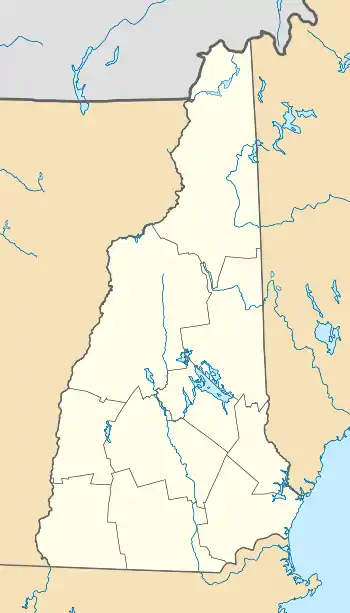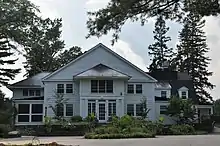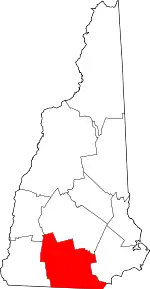MacDowell (artists' residency and workshop)
42°53′24″N 71°57′18″W MacDowell is an artist's residency program in Peterborough, New Hampshire. The program was founded in 1907 by composer Edward MacDowell and his wife, pianist and philanthropist Marian MacDowell. Prior to July 2020, it was known as the MacDowell Colony or "The Colony", but its board of directors shortened the name to remove "terminology with oppressive overtones".[3][4]
MacDowell Colony | |
 Colony Hall and Sigma Alpha Iota Cottage | |
  | |
| Location | 100 High Street, Peterborough, New Hampshire, U.S. |
|---|---|
| Built | 1907 |
| NRHP reference No. | 66000026 |
| Significant dates | |
| Added to NRHP | October 15, 1966[1] |
| Designated NHLD | December 29, 1962[2] |
After Edward MacDowell died in 1908, Marian MacDowell established the artists' residency program through a nonprofit association in honor of her husband, raising funds to transform her farm into a quiet retreat for creative artists to work. She led the organization for almost 25 years.
Over the years, an estimated 8,300 artists have been supported in residence with nearly 15,000 fellowships, including the winners of at least 86 Pulitzer Prizes, 31 National Book Awards, 30 Tony Awards, 32 MacArthur Fellowships, 15 Grammys, 8 Oscars, 828 Guggenheim Fellowships, and 107 Rome Prizes.[5] The artists' residency program has accepted visual and interdisciplinary artists, architects, filmmakers, composers, playwrights, poets, and writers, both well-known and unknown.[6] Since January 2020, Nell Painter has served as chair of MacDowell, the first woman to hold the position.[7]
History
In 1896, pianist Marian MacDowell bought Hillcrest Farm in Peterborough, New Hampshire, as a summer residence for herself and her husband, composer Edward MacDowell. She had always been careful to give him a quiet room for his work. They found that the New Hampshire landscape enhanced his work of composing music.[8]
The couple formulated a plan to provide an interdisciplinary experience in a nurturing landscape, by creating an institutionalized residential art colony in the area. In 1904, Edward MacDowell began to show signs of an illness that ended his composing and teaching career. He died in 1908.[9]
In 1907, Marian MacDowell deeded their farm to the Edward MacDowell Association and founded the MacDowell Colony. The first guests arrived that year: sisters Helen Farnsworth Mears, a sculptor, and Mary Mears, a writer. Mears wrote about her time on site for The Craftsman in July 1909.[8] MacDowell began by inviting applicants personally, but by the 1920s had consigned the admission process to a committee.
Marian and friends raised funds and found support from industrialist and philanthropist Andrew Carnegie, former U.S. President Grover Cleveland, financier J. P. Morgan, other prominent people, as well as many others across the country. MacDowell said the most consistent support came from women's clubs and professional music sororities (see, for example, the MacDowell Club of New York). At the age of 50, MacDowell began lecturing to women's groups to raise funds, resumed her performing career, and became a noted interpreter of her husband's work.[10]
Elizabeth Sprague Coolidge organized an effort in 1916 to build and name a studio at MacDowell in memory of her teacher Regina Watson. It was renovated in 1993 and became McDowell's first barrier-free studio that was accessible to everyone.[11]
By 1918, 31 of Isabelle Sprague Smith's students funded the creation of the Isabelle D. Sprague Smith studio.[12] Through the years more separate studios were built. The program continues in 32 studios scattered over 450 acres (1.8 km2) of land.[13]
On March 13, 2020, the MacDowell shut in the face of the COVID-19 outbreak and sent artists and Fellows home. It was the first time the site had shut since the 1938 New England hurricane.[14]
Medal Day
Every year, MacDowell presents the Edward MacDowell Medal to an artist who has made a significant cultural contribution. Residency at MacDowell is not a requirement. In 2019, the 60th Medal was awarded to a visual artist. Medal Day is one of the rare occasions when the site is open to the public. The ceremony includes a keynote speech, after which the artists open their studios to visitors.[15]
Property-tax dispute
MacDowell, a non-profit organization, enjoys the status of a charity, entitling it to exemption from local property taxes, among other things. However, in 2005, the town of Peterborough's selectmen (local-government executives) decided to challenge MacDowell's charitable status and billed the organization for a "payment in lieu of taxes". A lawyer for the town argued that "the Colony certainly benefits its artists-in-residence, but that doesn't strike us as being the general public."[16]
The then-Board of Directors paid the bill, then successfully challenged the charge.[17] A 2007 Superior Court opinion found that the MacDowell Colony, by promoting the arts, was a charitable institution, a ruling that was upheld by the New Hampshire Supreme Court in a subsequent appeal.[18]: p13 The appeal court found that "Contrary to the Town's assertions, MacDowell's articles of incorporation oblige it to use its property for its stated charitable purpose."[18]: p11
Awards
In 1962, the site and buildings were designated a National Historic Landmark District.[2][19][20]
In 1997, MacDowell Colony was awarded the National Medal of Arts.[21]
Notable works

- Aaron Copland worked there on composing the orchestral suite Appalachian Spring (1944), a 1945 Pulitzer winner.[22]
- Spalding Gray worked on his novel The Impossible Vacation, and later chronicled his experiences in his extended monolog Monster in a Box.[23]
- Leonard Bernstein completed his Mass.
- Thornton Wilder wrote Our Town and The Bridge of San Luis Rey.
- James Baldwin wrote Giovanni's Room.
- Willa Cather wrote Death Comes for the Archbishop.
- DuBose and Dorothy Heyward wrote Porgy and Bess.
- Virgil Thomson worked on The Mother of Us All.
- Alice Walker worked on her first novel and Meridian.
- Michael Chabon wrote The Amazing Adventures of Kavalier & Clay, a 2001 Pulitzer winner. Chabon served as chairman of the board from 2010 to 2020.[24][7]
- Alice Sebold wrote The Lovely Bones.
- Jonathan Franzen completed The Corrections.
See also
References
- "National Register Information System". National Register of Historic Places. National Park Service. January 23, 2007.
- "MacDowell Colony". National Historic Landmark summary listing. National Park Service. Archived from the original on June 6, 2011. Retrieved October 22, 2007.
- NHPR: "MacDowell Colony drops colony from tis name 7 July 2020
- MacDowell.org: "MacDowell Removes 'Colony' from Name" 7 July 2020
- MacDowell Colony FAQ
- Silverman, Art (March 6, 2007). "Artists Retreat into Solitude at MacDowell Colony". All Things Considered.
- "Best-selling Author and Visual Artist Nell Painter Appointed Chair of MacDowell Colony Board of Directors". MacDowell (Press release). January 22, 2020. Retrieved July 17, 2020.
- Rausch, Robin. "The House That Marian Built: The MacDowell Colony of Peterborough, New Hampshire".
- "Library Of Congress". Library Of Congress.
- Parker, Gail Underwood (2009). More than Petticoats: Remarkable New Hampshire Women. Morris Book Publishing.
- "Watson - Studios". MacDowell. Retrieved October 31, 2020.
- "Studios". The Musical Monitor. Mrs. David Allen Campbell, Publisher. 1918. p. 357.
- MacDowell Colony: Explore our studios
- Monadnock Ledger: "Colony announces temporary COVID-19 closure" 13 March, 2020
- "Medal Day". The MacDowell Colony. Archived from the original on April 7, 2008. Retrieved March 17, 2008.
- Winkleman, E. (November 1, 2005). "Local Government: McDowell Not Advancing Spiritual or Intellectual Well-Being of General Public". EdwardWinkleman.com.
- Brooks, Anthony (Author); Inskeep, Steve (Host) (October 13, 2005). "Town Demands Taxes from Long-Exempt Artists' Colony". All Things Considered. NPR.
{{cite news}}:|author=has generic name (help) - "Town of Peterborough v. The MacDowell Colony, Inc" (PDF). The Supreme Court of New Hampshire. March 14, 2008. Retrieved March 17, 2008.
- Bradford, S. Sydney; Rettig, Polly M. (January 6, 1976). National Register of Historic Places Inventory-Nomination: MacDowell Colony. National Park Service.
- Bradford, S. Sydney; Rettig, Polly (January 6, 1976). "Accompanying 5 photos, from 1907 and 1975". National Register of Historical Places Inventory-Nomination: MacDowell Colony. National Park Service.
- National Medal of Arts (1997). "Lifetime Honors". NEA.gov. Archived from the original on August 26, 2013.
- "The Pulitzer Prizes".
- "The MacDowell Colony". Archived from the original on August 15, 2015. Retrieved August 27, 2015.
- Carolyn Kellog (December 7, 2010), "Michael Chabon named chairman of MacDowell Colony board", Los Angeles Times.
Further reading
- Siegel J. (March 18, 2008). "The blood sucking vampires are circling: a victory for charity that should make all charities nervous". Charity Governance Consulting LLC. Archived from the original on September 12, 2011.
- New England Historical Society, "Marian MacDowell Founds the MacDowell Colony"
External links
- MacDowell
- Records of the MacDowell Colony, Library of Congress
- "Exhibits: The MacDowell Colony 1907–2007". Library of Congress. 2007.
- Hagedorn, Hermann (December 28, 1921). "The Peterborough Colony: "A Workshop, With A Wonderland Thrown In," For Creative Workers In The Seven Arts". The Outlook. Outlook Publishing Company, Inc. 129: 686–688. Retrieved July 30, 2009.
- Robin Rausch, "The House That Marian Built: The MacDowell Colony of Peterborough, New Hampshire," American Women: A Library of Congress Guide for the Study of Women's History and Culture in the United States. December 2001. Last updated May 29, 2019.
